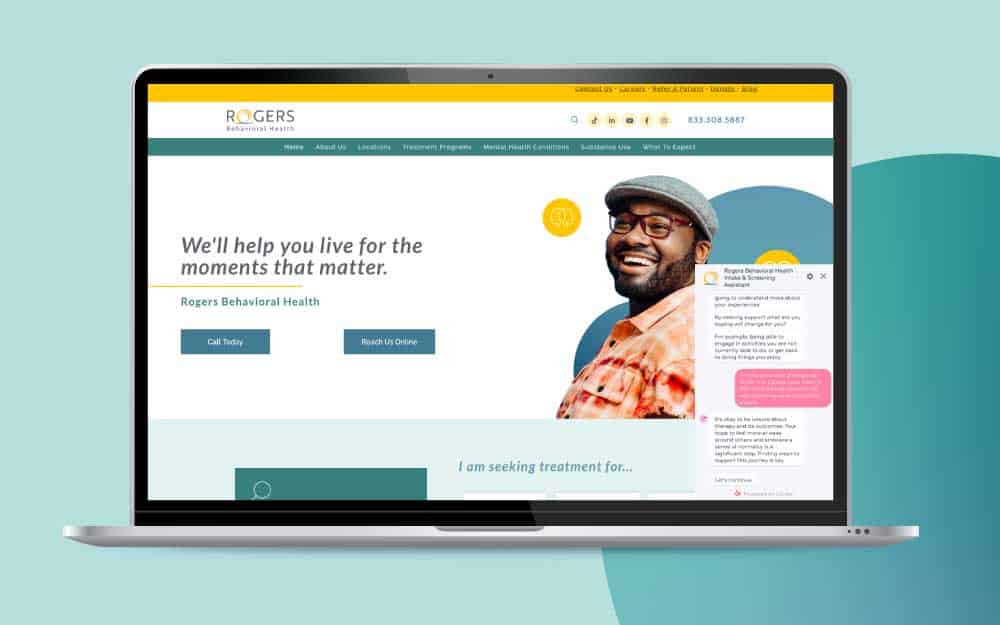At Rogers, we believe getting mental health and addiction care should be as easy as getting care for any other health concern. That’s why we’re using a new screening tool to make treatment more accessible and approachable.
Limbic Access
Rogers is collaborating with Limbic to offer Limbic Access, a clinically validated AI screening assistant. People seeking care can choose Limbic Access, our existing web screening form, or our phone number. Limbic Access confidentially gathers information to screen an individual. It is not an intake tool and does not make any clinical decisions. People are still interacting with a member of the Rogers team after the initial screening questions are complete.
Delivered on the Rogers’ website and trained on clinically validated assessment tools, it is one of the most evidence-based and safe behavioral health AI products available.
“It uses clinically validated tools to ask questions based on the information a person is entering,” explains Signa Meyers, Rogers’ vice president of strategic initiatives. “For example, if someone is talking about their mood, they’ll receive a mood screening. Rather than being a one-size-fits all tool, it’s flexible and highly responsive to each person.”
Limbic Access can work through initial screenings and has safety features built in for people in potential crisis.
“It can pick up on phrases or language throughout the screening, asking whether the person is safe and advising them to call Rogers, 911, 988, or go to their nearest ER,” says Signa. “Additionally, we are alerted of the safety risk and will call the person and follow up if they don’t call us. These safety features have allowed us to successfully admit individuals in crisis to inpatient care on the same day they reached out through Limbic.”
Benefits of Limbic Access
Though Limbic Access is a trained AI tool, it is highly compassionate and conversational, thanking a person for sharing information and asking how they are feeling.
“It provides a stigma-free and low-stress way for people to take the first step in seeking care,” says Brian Kay, Rogers’ chief strategy officer.
It does not replace diagnostic or screening tools, nor does it replace Rogers’ mental health professionals and the critical work they do. Rather, the AI tool offers another way for people to access treatment when they’re ready to ask for help.
“At Rogers, we embrace innovation to support people on their mental health journey,” explains Brian. “As one of the first U.S. organizations to use this technology, Rogers is leading the way in the behavioral health field. We will always rely strongly on our clinicians’ expertise, and Limbic Access provides us with another tool to help expand access and streamline the process for both patients and providers seeking care.”
Rogers’ commitment to expanding access to mental health care
Innovative initiatives such as this are key to Rogers’ commitment to expanding treatment access. Since we’ve made it available on December 12, we have screened more than 400 individuals, with 92% of them rating their experience as positive.
Research shows Limbic Access can increase the likelihood of historically marginalized groups seeking care. For example, a 2024 study in Nature Medicine shows the tool led to a 15% increase in people self-referring for treatment, with the increase being especially significant for:
- Individuals who identify as nonbinary (179% increase)
- Black individuals (40% increase)
- Individuals belonging to ethnic minorities in general (29% increase)
“Whether it’s because of social anxiety, stigma, or any number of valid reasons, sometimes people who are already experiencing mental health distress may not feel comfortable with traditional ways of getting into care, such as a phone call,” says Signa. “Certain populations may prefer the initial anonymity of not sharing details about themselves with another person. Ready at the very moment patients are, Limbic Access is an excellent way to open the front door to care for people who may not be likely to start treatment otherwise.”
Rogers’ other free screening options are always available, including over the phone at 833-308-5887 and screening requests at this webpage.
Rogers offers mental health and substance use support and treatment options
When you’re ready, our team of compassionate experts will help you find your path to recovery. We offer inpatient, residential and outpatient care in Wisconsin, in addition to partial hospitalization and intensive outpatient nationwide for children, adolescents, and adults.


